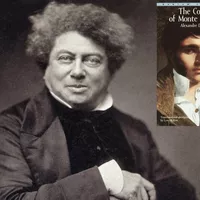Chapter 14. The Two Prisoners (4)
"Swear to me," replied Faria, "to free me if what I tell you prove true, and I will stay here while you go to the spot." "Are you well fed?" repeated the inspector.
"Monsieur, you run no risk, for, as I told you, I will stay here; so there is no chance of my escaping." "You do not reply to my question," replied the inspector impatiently. "Nor you to mine," cried the abbe. "You will not accept my gold; I will keep it for myself. You refuse me my liberty; God will give it me." And the abbe, casting away his coverlet, resumed his place, and continued his calculations.
"What is he doing there?" said the inspector.
"Counting his treasures," replied the governor. Faria replied to this sarcasm with a glance of profound contempt. They went out. The turnkey closed the door behind them.
"He was wealthy once, perhaps?" said the inspector.
"Or dreamed he was, and awoke mad." "After all," said the inspector, "if he had been rich, he would not have been here." So the matter ended for the Abbe Faria. He remained in his cell, and this visit only increased the belief in his insanity.
Caligula or Nero, those treasure-seekers, those desirers of the impossible, would have accorded to the poor wretch, in exchange for his wealth, the liberty he so earnestly prayed for. But the kings of modern times, restrained by the limits of mere probability, have neither courage nor desire. They fear the ear that hears their orders, and the eye that scrutinizes their actions. Formerly they believed themselves sprung from Jupiter, and shielded by their birth; but nowadays they are not inviolable.
It has always been against the policy of despotic governments to suffer the victims of their persecutions to reappear. As the Inquisition rarely allowed its victims to be seen with their limbs distorted and their flesh lacerated by torture, so madness is always concealed in its cell, from whence, should it depart, it is conveyed to some gloomy hospital, where the doctor has no thought for man or mind in the mutilated being the jailer delivers to him. The very madness of the Abbe Faria, gone mad in prison, condemned him to perpetual captivity.
The inspector kept his word with Dantes; he examined the register, and found the following note concerning him:--
Edmond Dantes: Violent Bonapartist; took an active part in the return from Elba. The greatest watchfulness and care to be exercised.
This note was in a different hand from the rest, which showed that it had been added since his confinement. The inspector could not contend against this accusation; he simply wrote,--"Nothing to be done." This visit had infused new vigor into Dantes; he had, till then, forgotten the date; but now, with a fragment of plaster, he wrote the date, 30th July, 1816, and made a mark every day, in order not to lose his reckoning again. Days and weeks passed away, then months--Dantes still waited; he at first expected to be freed in a fortnight. This fortnight expired, he decided that the inspector would do nothing until his return to Paris, and that he would not reach there until his circuit was finished, he therefore fixed three months; three months passed away, then six more. Finally ten months and a half had gone by and no favorable change had taken place, and Dantes began to fancy the inspector's visit but a dream, an illusion of the brain. At the expiration of a year the governor was transferred; he had obtained charge of the fortress at Ham. He took with him several of his subordinates, and amongst them Dantes' jailer. A new governor arrived; it would have been too tedious to acquire the names of the prisoners; he learned their numbers instead. This horrible place contained fifty cells; their inhabitants were designated by the numbers of their cell, and the unhappy young man was no longer called Edmond Dantes--he was now number 34.

